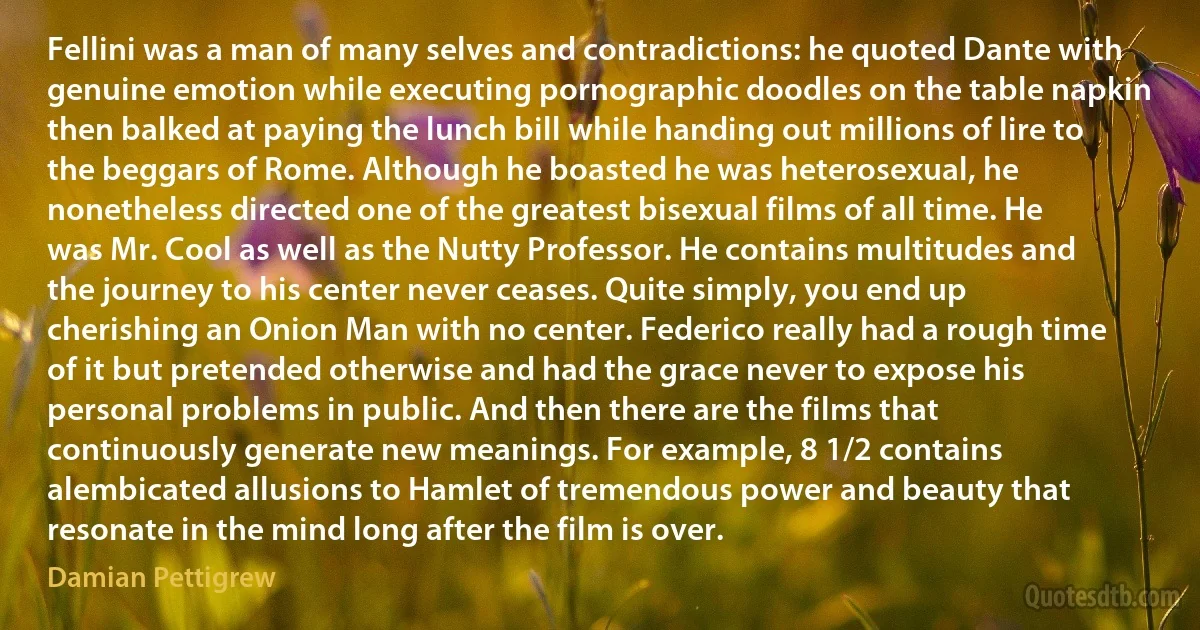
Fellini was a man of many selves and contradictions: he quoted Dante with genuine emotion while executing pornographic doodles on the table napkin then balked at paying the lunch bill while handing out millions of lire to the beggars of Rome. Although he boasted he was heterosexual, he nonetheless directed one of the greatest bisexual films of all time. He was Mr. Cool as well as the Nutty Professor. He contains multitudes and the journey to his center never ceases. Quite simply, you end up cherishing an Onion Man with no center. Federico really had a rough time of it but pretended otherwise and had the grace never to expose his personal problems in public. And then there are the films that continuously generate new meanings. For example, 8 1/2 contains alembicated allusions to Hamlet of tremendous power and beauty that resonate in the mind long after the film is over.
Damian PettigrewRelated topics
beauty bisexual cool end example executing film grace handing journey lunch man mind napkin onion power public quite table time well while heterosexual rome cherishing dante felliniRelated quotes
The Federal commissioners sat down across the mahogany table from their Southern hosts. After a couple of minutes of chitchat meant to be polite- but during which the three Confederates managed to avoid speaking directly to Butler- Seward said, "Gentlemen, shall we attempt to repair the unpleasantness that lies between our two governments?" "Had you acknowledged from the outset that this land contained to governments, sir, all the unpleasantness, as you call it, would have been avoided," Alexander Stephens pointed out. Like his body, his voice was light and thin. "That may be true, but it's moot now," Stanton said. "Let's deal with the situation as we have it, shall we? Otherwise useless recriminations will take up all our time and lead us nowhere. It was, if I may say so, useless recriminations on both sides that led to the breach between North and South."

Harry Turtledove
As for myself, I confess to a preference for clear-cut situations, for radical and even extreme positions. But I also feel a secret and very strong attraction to ambiguous situations... for example, that hovering moment when it is no longer day and not yet night, the shades of emotion between indifference and friendship... (they) are so fascinating because they are so indefinable. That which is pure transition, is all the more appealing to the mind because of its elusiveness. It is the same in the cases of Mondrian, Kandinsky and the Cubists: abstraction and figuration have a common frontier in their work that is so tenuous that we often do not know which side we are on. It is this ambiguity that imports a rare poetic charm to their paintings. Artists like Klee, Miro and Dubuffet have also pitched their tents on this borderline and constantly travel from one side tot the other.

Michel Seuphor
It had been the winter of 1835-6 that the ship, Alert, in her voyage for hides on the remote and almost unknown coast of California, floated into the vast solitude of the bay of San Francisco. All around was the stillness of nature. One vessel, a Russian, lay at anchor there, but during our whole stay not a sail came or went. Our trade was with remote missions, which sent hides to us in launches manned by their Indians... Over a region far beyond our sight there was no other human habitations, expect that an enterprising Yankee, years in advance of his time, had put up, on the rising ground above the landing, a shanty of rough boards, where he carried on a very small retail trade between the hide ships and the Indians. On the evening of Saturday, the thirteenth of August, 1859 (I again sailed into) the entrance to San Francisco, (now) the great center of worldwide commerce.

Richard Henry Dana, Jr.
The Filipino, it seems, has lost his soul, his dignity, and his courage. We have come upon a phase of our history when ideals are only a veneer for greed and power, (in public and private affairs) when devotion to duty and dedication to a public trust are to be weighted at all times against private advantages and personal gain, and when loyalties can be traded...Our government is in the iron grip of venality, its treasury is barren, its resources are wasted, its civil service is slothful and indifferent, its armed forces demoralized and its councils sterile. We are in crisis. You know that the government treasury is empty. Only by severe self-denial will there be hope for recovery within the next year...This nation can be great again. This I have said over and over. It is my articles of faith, and Divine Providence has willed that you and I can now translate this faith into deeds.

Ferdinand Marcos
I am an artist, and, through my eye, must confess to a tremendous bias. In my purely literary voyages my eye is always my compass. "The architectural simplicity” – whether of a platonic idea or greek temple – I far prefer to no idea at all, or no temple at all, or, for instance, to most of the complicated and too tropical structures of India. Nothing could ever convince my EYE – even if my intelligence were otherwise overcome – that anything that did not possess this simplicity, conceptual quality, hard exact outline, grand architectural proportion, was the greatest art. Bergson is indeed the arch enemy of every impulse having its seat in the apparatus of vision, and requiring a concrete world. Bergson is the enemy of the Eye, from the start; though he might arrive at some emotional compromise with the Ear. But I can hardly imagine any way in which he is not against every form of intelligent life. (p. 338)

Wyndham Lewis
